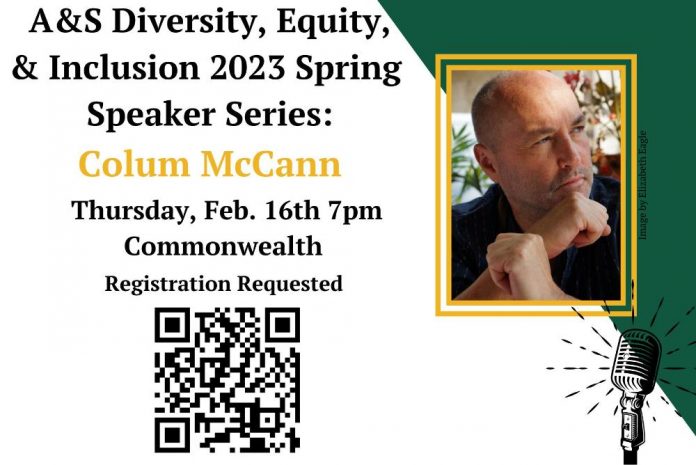Thursday, Feb. 16, acclaimed author Colum McCann spoke at the Commonwealth Auditorium in the Sadler Center for the inaugural Arts and Sciences Diversity, Equity and Inclusion 2023 Spring Speaker Series. In his lecture titled “How Storytelling Can Heal the World,” McCann spoke about the importance of sharing stories and how it can help bridge differences between people.
According to his webpage, McCann is an Irish writer of literary fiction who has seven novels, three collections of stories and two works of nonfiction to his name. Born and raised in Dublin, Ireland, McCann is the recipient of numerous international awards, including the U.S. National Book Award, several European awards and an Oscar nomination. In addition to his various accolades, McCann was elected to the American Academy of Arts in 2017.
Colum McCann is the President and co-founder of Narrative 4, a nonprofit global story exchange organization. According to the organization’s webpage, it offers educators creative tools to teach empathy and develop strong student leaders in the classroom and community.
“When we tell our stories, it seems sometimes we are increasingly putting parameters on ourselves, putting down borders and then we handcuff the stories somehow that they have to win a battle that, you know, you’re wrong, I’m right,” McCann said. “Don’t step into my world and I’ll stay away from my truth. And the more and more we see this sort of narcissistic need for us to be correct.”
McCann also pointed out that people are too guarded to connect with one another, resulting in a lack of trust and understanding. Still, McCann believes that sharing our stories might be one of the few things that can actually help us as storytelling can exhibit the possibility of emergence.
“And then our idea of stories and storytelling might be crimped by our politics, by the disease, as I say, of this certainty that the lungs of the world get increasingly sort of walled off and shrunken,” McCann said. “And by our lack of ability to get outside of ourselves, that our empathetic possibility gets walled off and we are in danger. Maybe we always were becoming so atomized, so small, and lack of affection for others becomes astounding.”
Students and faculty attended McCann’s talk. Blaze Banks ’25 learned about the event from his government professor, who emphasized the power of storytelling as an important democratic teaching practice.
“There was one quote that he had that was something like, ‘You can hate each other and you can go to war with each other, but you’re doomed if you don’t understand each other,’” Banks said. “And this related all to what he was talking about storytelling and how sometimes the bounds of certainty aren’t something that you need to have in order to have effective arguments or effective conversations because there’s a lot of nuance to things in how people perceive things. So as long as you understand where people are coming from and how people come about their stories and opinions, you can effectively facilitate conversations and change.”
Owen Wooliever ’26 also attended the event. He believed that McCann’s lecture was an informative experience that called attention to the significance of unity and compassion.
“Something that stood out to me was when he was talking about mystery and how mystery brings us all together,” Wooliver said. “I think that’s definitely the case with bringing people together through storytelling. I liked how he drew the parallels to our current political state.”
The importance of listening is another important point that McCann emphasized, as it enhances people’s ability to empathize with one another and make people better communicators. McCann believes that listening can lessen the divide of severance.
“Yet what we now have to tell stories about in order to look at our truest and darkest part of ourselves has no need for a history lesson here,” McCann said. “But so much, it seems, times have changed but so little has changed. We like to think we’re binding our imaginations together in some vast global effort. But so much of the time, it seems to me, that we’re closing down the curtains and locking down the GPS coordinates on our imaginations.”
Through storytelling, McCann believes that barriers can be broken, especially when people listen and converse with one another.
“Empathy is a muscle, and it’s a muscle that needs to be exercised and re-exercised,” McCann said. “What happens if the simple act of listening and talking becomes the thing that bolsters our very notion of peace, equality, democracy and understanding?”

